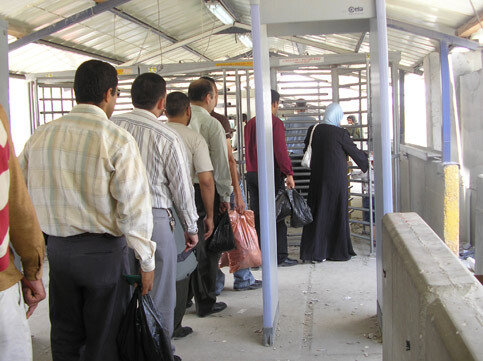IRIN 6 October 2006

Palestinians wait in a queue at Beit Iba checkpoint in Gaza. (Tom Spender/IRIN)
GAZA CITY - A report by the Palestinian Ministry of Health says that pregnant Palestinian women are often prevented by Israeli forces from reaching hospitals to receive appropriate medical attention, causing many miscarriages and the deaths of some women.
Since the beginning of the second Intifada, a Palestinian uprising against Israeli military occupation, in September 2000, 68 pregnant Palestinian women gave birth at Israeli checkpoints, leading to 34 miscarriages and the deaths of four women, according to the Health Ministry’s September report.
Thoraya Obaid, Executive Director of the United Nations Population Fund (UNFPA), said these figures underline the need to put an end to the agony of pregnant Palestinian women held at Israeli checkpoints.
“It is urgent to facilitate access by pregnant women to life-saving services, as stipulated by international humanitarian law,” Obaid said.
Rami Abu Shaaban of the Health Ministry’s Information Centre said that the amount of time Palestinians spend waiting at border crossings has increased dramatically over the past five years.
“Ten per cent of women who wished to give birth at medical centres had to spend hours on the road before reaching a hospital, while six per cent spent more than four hours. The normal time, before the Intifada, was 15-30 minutes,” Abu Shaaban said.
Munna al-Astal spent 19 days stranded at the Rafah Crossing between Gaza and Egypt before giving birth nearby.
She said she was among a number of Palestinians who were being processed through the crossing when it was closed by Israeli authorities for security reasons, leaving her and the others caught inside the terminal.
According to the Palestinians, Egyptian authorities do not let them back into Egypt once their passports have been given an exit stamp; and Palestinian authorities do not let them forward into Gaza if the border has been closed.
The stranded survive on food and water they are able to buy there and from handouts from the Egyptian Red Crescent. If they need urgent medical attention, they are taken to hospital in Egypt, but once they are able, they are returned to the crossing.
“I was visiting relatives in Egypt and on my way back to Gaza the crossing was sealed off by the Israelis,” al-Astal said. “I was about to give birth. I went into labour for several hours with no one to help me. Finally an ambulance came to take me to the Al-Areesh Hospital [in the Sinai] but I gave birth in the ambulance.
“I named my daughter Ma’abar [Arabic for ‘crossing’] to recollect the sufferings and hardships we both had at the Rafah terminal,” she added.
According to the Health Ministry’s report, there are currently 117,600 pregnant women in the Palestinian territories. This includes 17,640 women who are suffering difficult pregnancies due to a lack of prenatal and postnatal care.
“Inadequate medical care during pregnancy is the third leading cause of death among Palestinian women of childbearing age,” said Abu Shaaban.
UNFPA has been helping pregnant women avoid suffering at checkpoints by training health personnel and equipping them with delivery kits to provide services within their communities. It has also formed local community support teams to assist health providers and raise awareness of the availability of delivery services.
Soon after the capture of an Israeli soldier on 25 June by Palestinian militants, Israel launched a military offensive in the Gaza Strip and tightened its control of border crossings. Damage to the Gaza infrastructure, including health, communication, power and transport facilities has been extensive.
This has compounded the suffering of the 1.4 million inhabitants of the Gaza Strip, particularly women and young people, health workers say.
“We conduct such restrictions at checkpoints because we receive security warnings of planned attacks on our soldiers and civilians,” said Amira Aron, director of the Arab Media Department in the Israeli Ministry of Foreign Affairs.
“Israel has horrible experience of Palestinian women being used in carrying out suicide bombings against Israeli civilian and military targets. We know that such measures increase hatred between the two peoples, but we have to defend and protect our civilians,” she added.
Related Links